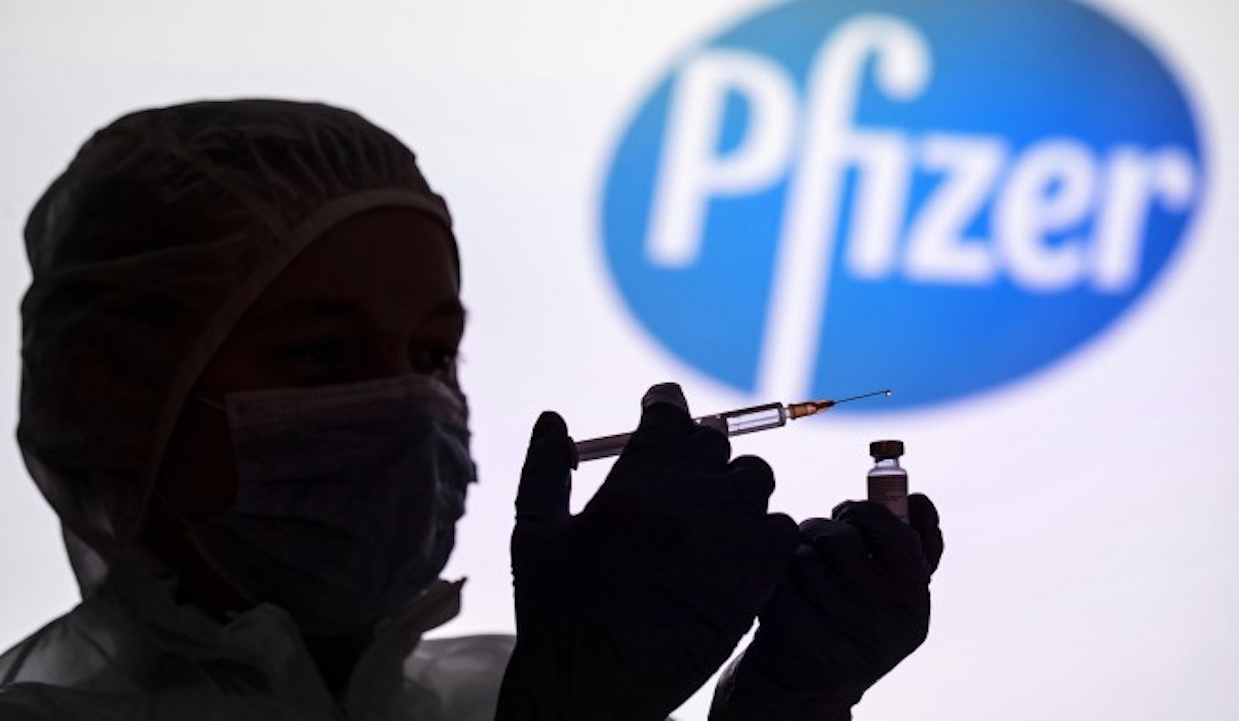Pfizer Overpays to Buy Pharmaceutical Company for Cancer Treatments after mRNA Turbo-Cancer Boom

Original headline:
Pfizer Shells Out $43 Billion for Cancer Drugmaker With Sales of Only $2.2 Billion
by Brenda Baletti, Ph.D. – originally published on The Defender – News website of Children’s Health Defense association
All links to Gospa News articles have been added aftermath, in relation to the topics highlighted
Subscribe to the Gospa News Newsletter to read the news as soon as it is published
Pfizer last month spent $43 billion to acquire a biotech company — with projected 2023 sales of $2.2 billion — that develops cancer drugs.
Seagen, formerly Seattle Genetics, specializes in working with antibody-drug conjugate, or ADC, technology. Its primary drugs are designed to use monoclonal antibodies to deliver anti-cancer agents to tumors while limiting damage to surrounding tissue.
The deal had been in the works since early 2023, but Pfizer had to clear several hurdles in the regulatory process to address the antitrust concerns raised by the Federal Trade Commission (FTC). To satisfy the FTC, Pfizer agreed to donate royalties from its existing bladder cancer drug, Bavencio, to the American Association for Cancer Research.
Prior to the acquisition, Seagen had four cancer drugs on the market — Adcetris, Padcev, Tivdak and Tukysa — approved by the U.S. Food and Drug Administration (FDA). The Bothell, Washington-based company also had several other drugs in development.
Seagen’s 2022 total sales from those drugs were just under $2 billion and its losses were $610 million. Pfizer CEO Albert Bourla explained the high-price purchase to reporters in March. “We are not buying the golden eggs,” he said. “We are acquiring the goose that is laying the golden eggs.”
Bourla added that Pfizer plans to let Seagen “keep innovating” with Pfizer’s resources and that it expects Seagen products to bring in $10 billion in revenue by 2030.
The Seagen deal marks a change in focus for Pfizer, which saw its revenues skyrocket to $100.3 billion in 2022, with $56 billion of that coming from its mRNA COVID-19 vaccine, the highest-selling pharmaceutical product in a single year, and Paxlovid, a COVID-19 treatment widely associated with rebound infection.
But with COVID-19 vaccine sales plummeting — for all vaccine makers — Pfizer’s share price has dropped by 42% since 2022, and its share prices are currently valued at lower than they were before the pandemic.
The Seagen acquisition doubled Pfizer’s oncology pipeline, Fierce Pharma reported, to 60 programs with nine blockbuster oncology drugs already FDA-approved. The company announced it will develop and commercialize its oncology drugs under a separate division led by Chris Boshoff, M.D., Ph.D., who had been its research and development chief.
‘Something very sinister’ about the deal
When Pfizer announced its acquisition of Seagen, online commentators were quick to point to the link between COVID-19 vaccines and rising cancer rates, namely the appearance of “turbo cancers” a term used to describe rapid-onset, aggressive cancers, often in young people, or the return of cancer post-COVID-19 vaccine in people who were cancer-free for years.
Dr. William Makis, an oncologist and cancer researcher who studies turbo cancers wrote that “something very sinister lurks in the details of this deal.”
Bioscience researcher David Wiseman, Ph.D., told The Defender that with existing data, it isn’t possible to draw a direct connection between Pfizer’s pivot to cancer treatment and vaccine side effects.
However, he said, the growing number of reports of cancers linked to the vaccine, the safety signals for cancers within the public health agencies’ own data, the total lack of research by both Pfizer and Moderna into the carcinogenic effects of the vaccines, and other key information about the mRNA shots in the scholarly literature make further investigation of that link imperative.
“There’s a lot of data on cancers and all-cause mortality in general of varying quality,” he said. “Someone needs to get good quality data and go through it in a systematic way to get to the bottom of it.”
“The optics of Pfizer saying, ‘So now we’re in the oncology business’ are certainly not good,” Wiseman said. “And if they are willing to spend $40 billion on it, I think they could put a couple of those dollars aside to do the studies that really need to be done — the long-term studies on cancer-related issues to do with COVID-19 vaccines.”
Oncology market booming
The global oncology drug market size is projected to skyrocket in the next several years. Allied Market Research estimates it will grow from $135 billion in 2020 to more than $274 billion in 2030. IQVIA estimates the market will be valued at $375 billion by 2027, and Statista projects a market value of over $359 billion by 2028.
This potential market growth comes as several Big Pharma companies are facing a “looming patent cliff” The Wall Street Journal reported, with $200 billion in annual sales going off-patent this decade. Companies are competing with one another for desirable biotech companies and drugs. Several pharmaceutical companies are investing heavily in ADC drugs and other cancer treatments.
AbbVie announced in November it was paying $10.1 billion to acquire ImmunoGen, maker of the ovarian cancer treatment Elahere, which received accelerated approval from the FDA in 2022.
Bristol Myers Squibb in December 2023 announced an $800 million upfront deal with SystImmune for an ADC candidate currently in Phase 2 trials. Johnson and Johnson announced Monday that it will acquire ADC drug developer Ambrx and its pipeline of targeted cancer drugs for $2 billion.
Merck paid $4 billion in October 2023 to license three ADC drugs from Daiichi Sankyo to treat various cancers. Fierce Pharma noted this acquisition puts ADC drugs at the center of Merck’s “post-Keytruda future.” Its blockbuster cancer drug Keytruda will lose market exclusivity in 2028, meaning generic versions will start to be produced.
Merck also continues to “enhance [its] oncology pipeline through strategic acquisitions,” it said when it announced Tuesday that it has entered into an agreement to acquire Harpoon Therapeutics, which has a portfolio of cancer immunotherapy drugs in development, for approximately $680 million.
Growing evidence COVID shots link to cancers must be investigated
Experts are seeing a growing body of evidence linking the shots to a variety of cancers and many have been calling for more investigation into the issue.
Most recently, Kevin McKernan, chief scientific officer and founder of Medicinal Genomics and his colleagues identified host cell DNA fragments in the Pfizer and Moderna mRNA shots.
Scientists studying the vaccines found bacterial DNA left over from the microscopic plasmids used for multiplying DNA in the mRNA vaccine manufacturing process.
McKernan said that annotating Pfizer’s COVID-19 vaccine sequence with a simple online tool reveals the presence of DNA from simian virus 40 (SV40), a known cancer promoter. He said this raises concerns that the plasmid DNA could lead to cancers or autoimmune issues in some vaccine recipients.
This discovery was so concerning that Florida Surgeon General Joseph Ladapo, M.D., Ph.D., called for a “halt in the use of COVID-19 mRNA vaccines” over safety concerns after reporting the FDA failed to adequately respond to his inquiry into the issue.
All links to Gospa News articles have been added aftermath, in relation to the topics highlighted
Subscribe to the Gospa News Newsletter to read the news as soon as it is published
by Brenda Baletti, Ph.D. – originally published on The Defender – News website of Children’s Health Defense association
Brenda Baletti Ph.D. is a reporter for The Defender. She wrote and taught about capitalism and politics for 10 years in the writing program at Duke University. She holds a Ph.D. in human geography from the University of North Carolina at Chapel Hill and a master’s from the University of Texas at Austin.
MAIN SOURCES
Wenstrup Releases Statement Following Day 1 of Dr. Fauci’s Testimony
GOSPA NEWS – COVID & VACCINES REPORTS
GOSPA NEWS – WUHAN-GATES DOSSIER
Moderna AWARE that mRNA Jabs cause CANCER due to DNA Fragments. Malone Unveils Patent
https://www.gospanews.net/en/2023/08/22/turbo-cancer-after-covid-mrna-vaccines-4-international-studies-highlight-lymphomas-risk-as-serious-adverse-reactions/




